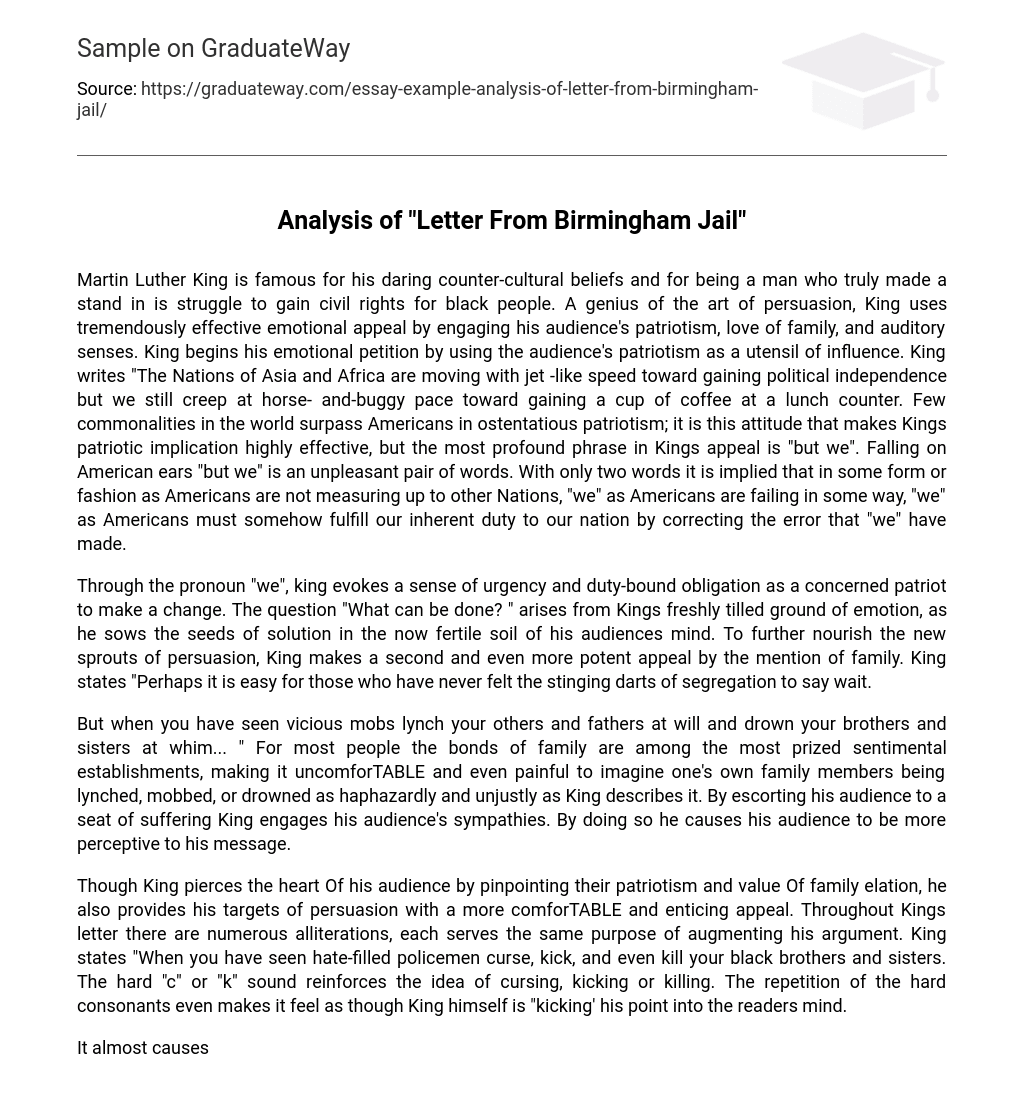Martin Luther King is famous for his daring counter-cultural beliefs and for being a man who truly made a stand in is struggle to gain civil rights for black people. A genius of the art of persuasion, King uses tremendously effective emotional appeal by engaging his audience’s patriotism, love of family, and auditory senses. King begins his emotional petition by using the audience’s patriotism as a utensil of influence. King writes “The Nations of Asia and Africa are moving with jet -like speed toward gaining political independence but we still creep at horse- and-buggy pace toward gaining a cup of coffee at a lunch counter. Few commonalities in the world surpass Americans in ostentatious patriotism; it is this attitude that makes Kings patriotic implication highly effective, but the most profound phrase in Kings appeal is “but we”. Falling on American ears “but we” is an unpleasant pair of words. With only two words it is implied that in some form or fashion as Americans are not measuring up to other Nations, “we” as Americans are failing in some way, “we” as Americans must somehow fulfill our inherent duty to our nation by correcting the error that “we” have made.
Through the pronoun “we”, king evokes a sense of urgency and duty-bound obligation as a concerned patriot to make a change. The question “What can be done? ” arises from Kings freshly tilled ground of emotion, as he sows the seeds of solution in the now fertile soil of his audiences mind. To further nourish the new sprouts of persuasion, King makes a second and even more potent appeal by the mention of family. King states “Perhaps it is easy for those who have never felt the stinging darts of segregation to say wait.
But when you have seen vicious mobs lynch your others and fathers at will and drown your brothers and sisters at whim… ” For most people the bonds of family are among the most prized sentimental establishments, making it uncomforTABLE and even painful to imagine one’s own family members being lynched, mobbed, or drowned as haphazardly and unjustly as King describes it. By escorting his audience to a seat of suffering King engages his audience’s sympathies. By doing so he causes his audience to be more perceptive to his message.
Though King pierces the heart Of his audience by pinpointing their patriotism and value Of family elation, he also provides his targets of persuasion with a more comforTABLE and enticing appeal. Throughout Kings letter there are numerous alliterations, each serves the same purpose of augmenting his argument. King states “When you have seen hate-filled policemen curse, kick, and even kill your black brothers and sisters. The hard “c” or “k” sound reinforces the idea of cursing, kicking or killing. The repetition of the hard consonants even makes it feel as though King himself is “kicking’ his point into the readers mind.
It almost causes one to wince at the sound of the three words. Alliteration stands as a highly effective element in emotional persuasion because the human brain enjoys well patterned sounds and auditory sequences. These sounds and sequences are much like nursery rhymes such as “Ring around the Rosier” in the same way that childhood incantations stay with children for the rest of their lives, Kings Message possesses the same lasting effect The flow of Kings words and the usage of rhetorical devices capture the audience’s attention, and as a result the listener continues to be alienTABLE to being persuaded.
Emotional appeal acts effectively in persuasive writing because it breaks down mental walls that an audience possesses. Human sentiment is a formidTABLE contender even among the most powerful forces of nature. If one can manipulate the Way another individual feels, he obtains a sizTABLE measure of control over that individual. King utilizes emotional appeal by discussing family, love of country, and by structuring his words and phrases to allure the reader, and as a result he continues to be regarded as one of history’s greatest persuaders.





